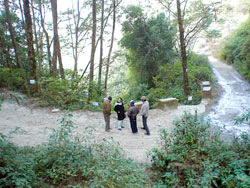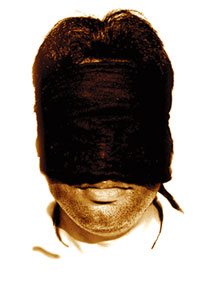|
|
In the hills of Shivapuri National Park north of Kathmandu lies a suspected mass grave or cremation site where the bodies of 49 alleged Maoist supporters who went missing in 2003 and are believed to have been buried.
The inmates were taken in trucks from the Army's detention centre at the Bhairabnath Battalion in Lazimpat (see: Nepali Times #351, www.nepalitimes.com/issue/351/Headline/13579). The National Human Rights Commission along with a team of forensic experts began excavating the Shivapuri site last week. Results of the Shivapuri investigation will help answer lingering questions for the families of the Bhairabnath detainees.
A glimpse of the reality of Bhairabnath Battalion is seen in Pranay Limbu's extraordinary documentary Forgive! Forget Not! screened at the 5th annual Kathmandu International Mountain Film Festival earlier this month. The majority of the film is told through journalist Bhai Kaji's blindfolded eyes as he miraculously survives 15 horrific months of excruciating torture at the hands of security forces who are convinced he is a Maoist supporter.
At the end of the film, Limbu asked Kaji if he seeks revenge for the atrocities he suffered. Kaji explains that revenge is never-ending. He would rather stop the cycle of violence by forgiving his torturers and helping expose the whereabouts of other detainees who have disappeared into secret detention centers run by the security forces or taken by the Maoists.
Kaji's decision to choose forgiveness over vengeance and to work toward social justice is a lesson the political parties should take to heart. A Nepali Truth and Reconciliation Commission (TRC) could lead to forgiveness and social justice if the political parties, who are authorised by the interim constitution to create a TRC, do not construct one simply for legal prosecutions and blanket amnesties.
As in Peru and South Africa, a TRC that goes beyond mere legal justice and that is driven by the victims and their communities will achieve a more genuine and holistic sense of justice, a social justice. In turn, this kind of Nepali TRC can lead to reconciliation at the local and national levels, as well as immense gratitude to the political parties for fulfilling their promise to address the injustices inflicted on the Nepali people.
|
|
As the political parties begin creating a Nepali TRC, they should listen to what the Nepali people want. High on their list of wants is for the political parties to follow through with a promise they made a year ago. Days after signing the comprehensive peace accord in November 2006, both the Maoists and the seven political parties pledged to disclose the names and whereabouts of the disappeared who were taken by either the Maoists or the Security Forces within 60 days of signing the accord. It has now been a year and the Shivapuri excavation is the closest the families of the disappeared have come to receiving information on their loved one's whereabouts.
Over the course of the 11 year 'people's war', there have been anywhere from 600-3,000 cases of disappeared persons. The International Committee of Red Cross (ICRC) lists 1,042 disappeared persons whose whereabouts are currently unknown, including the 49 Bhairabnath detainees. The psychological, emotional, and economic toll on the families is unimaginably high, especially for the wives of the disappeared who must fill the economic void left by their disappeared husbands. This month, at a public testimonial wives of the disappeared told their stories of life after the husbands were taken away and their daily struggle for survival.
The political parties need to hear the stories of these women and also listen to Kaji's words of forgiveness and social justice. They would then feel compelled to give all the families of the disappeared at least partial information on their loved one's whereabouts. The Shivapuri investigation is a positive step toward fulfilling the political parties' year old promise. An even bigger step would be to disclose all the names and whereabouts of the disappeared and to create a TRC that is centered on social justice. It could very well translate into votes during the upcoming election as well as safeguard the peace process in 2008.




